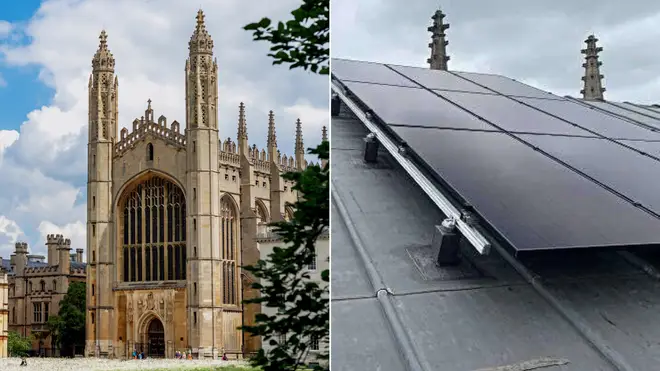On Air Now
Relaxing Evenings with Zeb Soanes 7pm - 10pm
8 February 2023, 17:04 | Updated: 8 February 2023, 17:39

The 15th-century Cambridge college has received backlash to the decision, despite the introduction of solar panels promising an output of 105,000 kWh of energy a year.
King’s College Cambridge will have almost 500 solar panels installed on its chapel roof, after the controversial plans received approval from the local council yesterday.
On Tuesday 7 February, Cambridge County Council unanimously passed the college’s application to build 492 solar panels on top of their chapel roof, home to the world-renowned Choir of King’s College, Cambridge.
The Provost of King’s, Professor Michael Proctor told Classic FM the college was “greatly heartened” by the council’s decision to approve the panels.
Proctor added that the decision signifies a “demonstrable commitment to taking action on climate change”.
He continued: “The panels will have only a very minimal impact on the visual appearance of the Chapel, but will make a considerable difference in the process of decarbonisation by fulfilling the entire energy demands of the Chapel and reducing our carbon emissions by more than 27 tonnes each year.”
The solar panels will populate the gothic chapel roof, producing an approximate 105,000 kWh of energy a year – enough to run the chapel’s electricity, and saving around £20,000 in energy bills per year. The college confirmed that any excess energy would be sold off to the national grid.
Read more: Everything you need to know about the Choir of King’s College, Cambridge

O Holy Night – Choir of King's College Cambridge
Professor Proctor continued: “The installation of the panels has been designed to dovetail with the crucial conservation works to the Chapel roof, which will see the whole lead covering removed, rolled and replaced, all while maintaining access to the building for visitors, daily services and concerts”.
The decision has however received backlash, notably from Historic England, and the nearby Cambridge City Airport. Historic England were reportedly ‘disappointed’ by the decision from Cambridge council, and as part of the council’s unanimous decision, the solar panels will need to pass a ‘glint and glare assessment’ called for by the city airport.

King's College Chapel: an architectural masterpiece and the man who told its story
Many cathedrals have installed solar panels across the country, including Chester and Gloucester Cathedral.
In 2022, Chester installed 200 solar panels on its roof as part of the wider church of England goal to become net zero by 2030, and Gloucester cathedral has 150 solar panels hidden away on their nave roof, which generates around 25 percent of the cathedral’s energy usage.
While the number of solar panels due to be added to the roof of King’s College Chapel is greater than either of the above, Professor Proctor assured that plenty of care would be taken in the process.
“Having been custodians for nearly 600 years, as a College we are inherently aware of the duty we have to protect the Chapel as a building of remarkable historic significance and as a world-renowned venue for classical music,” Proctor said.
“We will continue to invest in the care and repair of the building for the benefit of everyone, forever.”

New Solar Panels Installed at Salisbury Cathedral
A 2013 study by researchers at Imperial College London and Queen Mary University of London showed that solar panels actually work better when exposed to music, of multiple genres.
Scientists at the university proved that when exposed to high pitched sounds, like those found in rock and pop music, the solar cells’ power output increased by up to 40 percent.
Classical music was also found to increase the solar cells’ energy production, but slightly less so than rock and pop, as it generally plays at a lower pitch than pop and rock.
Whether they know it or not, British band Coldplay are just one of the artists benefitting from this research. During their 2021 tour, they installed solar photovoltaic panels in the build-up to each show, “behind the stage, around the stadium and where possible in the outer concourses”.